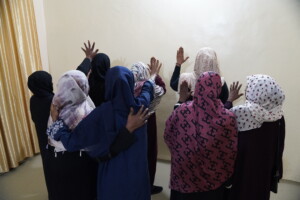South Darfur Wali suspends schools amid student strikes
Basic and secondary school studies in South Darfur have been suspended indefinitely, due to student protests that have been taking place following an attack on teachers on Monday.
 A basic school teacher in Darfur (File photo)
A basic school teacher in Darfur (File photo)
Basic and secondary school studies in South Darfur have been suspended indefinitely, due to student protests that have been taking place following an attack on teachers on Monday.
In a press statement on Wednesday, the acting Wali (governor) of South Darfur, Hamid El Tijani Hanoon, said that the decision to suspend studies “in order to preserve the safety of the public and students,” was issued after a meeting of the state security committee, which consulted with the state education department. The decision excluded the conduct of the try-out exams for students of the basic and secondary school, which will still be held on 26 and 27 March.
The school demonstrations, now into their fourth day, denounce Monday’s attack on teachers, as well as the dire living conditions in the South Darfur capital Nyala.
People in Nyala described the demonstrations to Radio Dabanga, as “massive and unprecedented”. They said that demonstrators marched through the city towards the governor’s house. The demonstrators closed most of the main roads with barricades, while the police fired tear gas at the students. The demonstrations turned into a hit and run between the students and the police.
The demonstrations also caused the closure of the Central Bank of Sudan, commercial banks, and shops in the Nyala market.
Students in Atbara in River Nile state organised mass protests against the coup and their living situation on Wednesday. Members of resistance committees active in the neighbourhoods of Atbara participated in the demonstrations, and the demonstrators roamed the main roads in the city, chanting slogans denouncing the living situation and calling for the overthrow of the coup amid a large deployment of police forces.
In Blue Nile state, mass student demonstrations erupted in Ed Damazin and El Roseires, in protest against the high prices and the military coup.
The Ed Damazin Resistance Committees reported that joint forces of the police and the paramilitary Central Reserve Forces used excessive violence and tear gas in the face of peaceful demonstrations. A house burned down in northern Ed Damazin, as a result of tear gas canisters being thrown inside residential neighbourhoods.
In White Nile state, the resistance committees closed the road linking the state capital Rabak with Kosti, in El Obeid in North Kordofan, rejecting the military coup, demanding full civilian rule, and the return of the army to the barracks.
Demonstrations in Khartoum continued in various neighbourhoods to demand the overthrow of the military coup.











 and then
and then